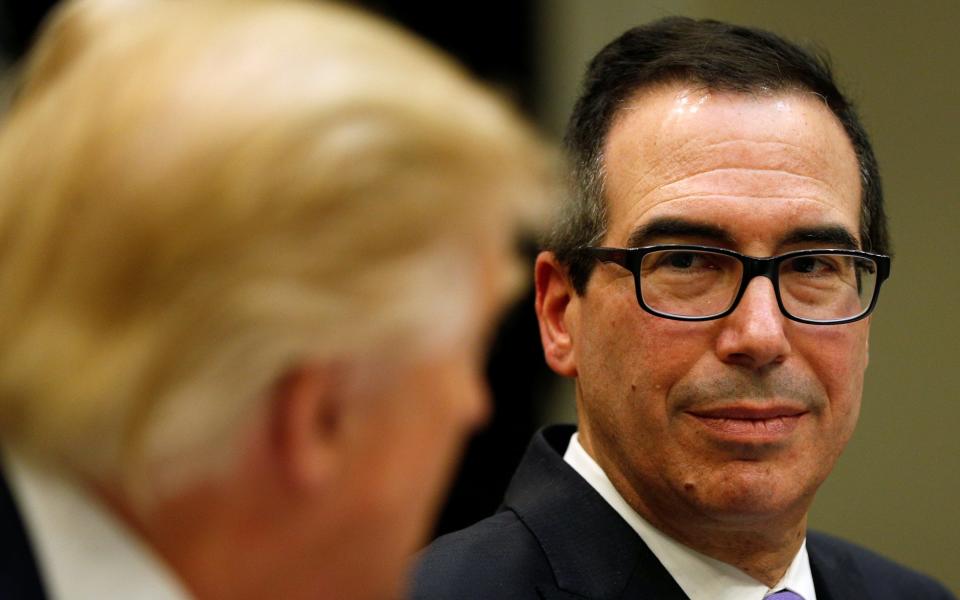Mnuchin promises major tax cuts and bonfire of red tape by August in bid to double growth

US economic growth should double thanks to radical tax cuts and deregulation, Donald Trump's new Treasury Secretary Steven Mnuchin has claimed, as he promises to pass a series of major reforms by August.
In his first major intervention since being confirmed in the job a week ago, Mr Mnuchin argued the economy “underperformed” in the Obama-era and needs to be unleashed to become more competitive and to grow more strongly.
The plans outlined so far have little detail, which he said is being addressed with more than 100 tax specialists in the Treasury working “around the clock”.
“Our economic agenda, the number one issue is growth, and the first most important thing that will impact growth is a tax plan,” the Treasury secretary said in an interview with CNBC.
“We are committed to pass tax reform, it will be very significant, it is going to be focused on middle income tax cuts, simplification and making business tax competitive with the rest of the world - which has been a big problem and a reason why companies are leaving and cash is sitting off shore. We want to get this done by the August recess.”
He claims the plan should help to double America's economic growth rate from 1.6pc in 2016 to more than 3pc by the end of 2018.
“If you look at long-term growth we have underperformed where we need to be. We believe that we can be competitive and get back to sustained growth of 3pc or more,” he said.
His ideas chime with the President's view that a wide-ranging overhaul of economic policy is intended to shake the economy out of what Mr Trump sees as a period of medicore growth.
This position is disputed, however, as some economists say the US is already growing well and may be at risk of overheating, while the Federal Reserve is keen to raise interest rates to stop inflation getting out of hand.
Credit ratings agency Moody's acknowledges that the policies should boost the US economy, and indeed the wider world.
But it puts more modest numbers on the US growth outlook, anticipating growth of 2.4pc in 2017 and 2.5pc in 2018, up from earlier forecasts of 2.2pc and 2.1pc respectively.
“Our forecasts incorporate a mix of cuts in federal income taxes and corporate tax rates and an increase in public infrastructure spending, all of which would boost growth in the near term,” said Madhavi Bokil at Moody’s Investors Service.
Moody’s also warns that the Trump administration represents substantial risks to the world economy, particularly if the government embarks on a major round of protectionism, or if the extra government spending prompts a surge in inflation and so an interest rate hike.
“We see four major systemic risks to our forecasts: global economic risks associated with shifts in US trade; risks to global financial markets and emerging market economies if US interest rates were to rise faster than anticipated and/or the US dollar were to appreciate sharply,” said Mr Bokil.
There are risks in other parts of the world as well: “risks of a sudden and sharp deceleration in China; and political and fragmentation risks in the EU and the eurozone.”
Mr Mnuchin defended the plan against the idea that it will aid the rich, arguing that any tax cuts for high earners would be offset by closing other tax loopholes.
His plan to slash business levies could add to the current phase of tax competition globally.
Britain has been slashing its corporate tax rate to become more competitive - the headline rate of corporation tax has already fallen from 28pc in 2010 to 20pc today and will fall further in April.
The British government has hinted that further cuts could come to make the UK a more attractive base for businesses after Brexit, but major tax cuts in the US could create a new competitors in the same area.
The former Goldman Sachs executive and hedge fund manager said he wants to cut red tape which has “prevented small and medium-sized businesses from being the engine of growth in this country”.
He also said he is “looking at Dodd-Frank”, the main packaged post-financial crisis bank regulation, to “make sure that banks can lend”, raising the idea that regulation is preventing lending to companies and households.
Once these reforms have come into force this year he said he expects a delay before the economic impact is felt.
“I think it is going to take time to get there… it is definitely going to take into next year to see an engine of growth,” Mr Mnuchin said.
The Treasury secretary raised the prospect of an argument over the budget deficit, noting that his forecasts for the cost of these measures will probably predict higher growth numbers and so higher revenues than other forecasters, so his figures will anticipate better public finances.
He also said he is considering the idea of issuing 50-year or 100-year bonds with the aim of locking ultra-low interest rates into the US finances.
Mr Mnuchin added that he expects interest rates to rise but to remain low by historic standards, and he played down the idea he could declare China to be a “currency manipulator”, noting only that he is in discussion with foreign leaders and is interested in relative currency values.

 Yahoo Finance
Yahoo Finance 